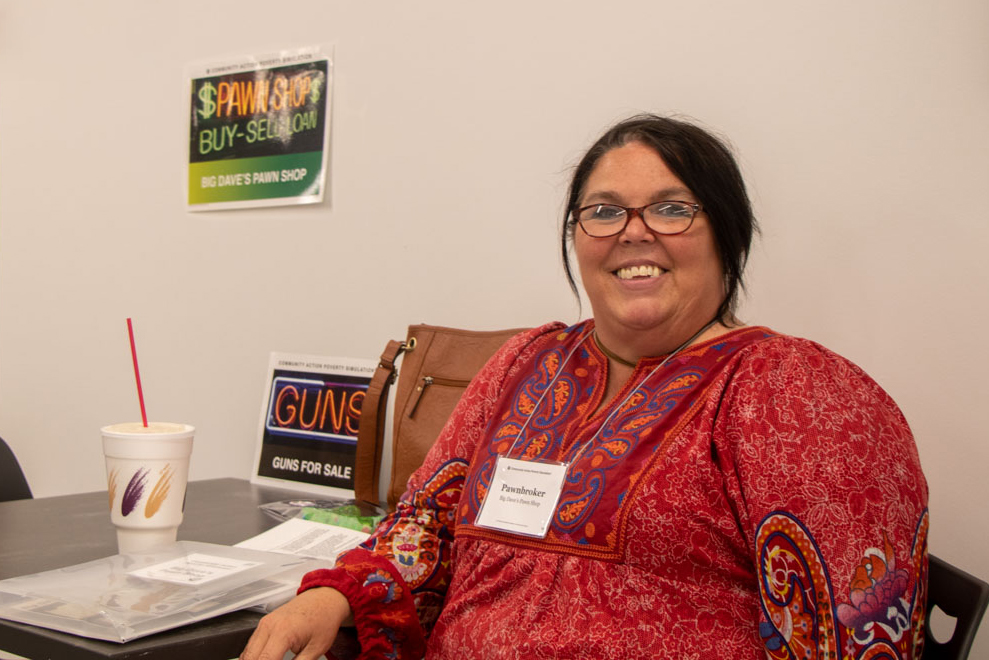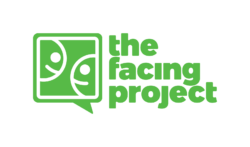Lisa Vernon‘s story as told to Kellie Arrowood

I learned about the Poverty Simulation through Shafer Leadership Academy (I’m a big fan!). Open Door Health Services encourages its employees to go to their trainings. I usually feel empowered when learning new ideas to implement at work and in my personal life. I advocated for others to join me at this training, and so my co-worker Nancy decided to go with me.
We didn’t know what to expect. Something like a game, but more to get an idea of what those we serve are going through. When we arrived at the Ross Community Center, we were directed into the gym area. There were tables all around the room, with irregular groupings of chairs in the middle. We walked in and received our tags and had to find our seats.
I was sitting with two other people (neither of them had been to a simulation before either). We started looking through the packet that included a description of our family unit, laying out the roles we would be playing and what “resources” we had. Brief descriptions of some limitations to navigate. I had a job! Okay! I looked around our “town” and at the “businesses” circling around the room: Grocery Store, School, Employer, Homeless Shelter, etc. Our “neighborhood” was a cluster of chairs (houses) with other “families” in them.
Nancy, was all alone. Sitting in her chair in a “family” of one, reading her packet with no one else.
When our “week” started, I had to get to work but we were still trying to figure out our plan. By the time we figured out what we were doing, I was late to work and got laid off!
I thought, I have to have a job! We won’t make it!
My partner was already staying at home with our two children to save money on transportation costs. I needed all of the transportation passes to get around to look for a job and even be at work. I knew it wasn’t real, but I started getting caught up in it. I started feeling anxious. I didn’t want to let my “family” down. I literally started sweating!
I did eventually get re-hired by the employer . . . but by then our transportation passes ran out. I was going nuts. This was crazy. How am I supposed to do anything without a job? I can’t get to my job because I didn’t have the right passes to travel there. I was so frustrated. My heart started pounding. I was going to fail this. It wasn’t real, but I wanted to succeed. I could/can do this. I ran to an “agency” where I could get some help with those tickets to success. I tried to talk to the guy at the desk and he IGNORED ME! He was taking pictures! WHAT IS GOING ON?! I can survive this if I could just get some help and then I could get back to work. That employer wasn’t going to take another excuse. I needed help!
I was trying to be nice to the agency person in the moment, because I didn’t know what would happen if I wasn’t. Would I fail because this person wouldn’t even listen to me? All that anger and frustration was welling up inside.
Then it hit me. I understood what others must feel like when they just want to get past whatever obstacle is in front of them. On to the next thing. Struggling to just succeed in this one thing. This “make it or break it” moment. Okay, now I see why patients get loud . . . to be heard!
I saw Nancy and chatted with her real quick. She was scrambling, too. She was nervous that she was going to fail. It was like watching another person trying not to drown. The pace was hectic and we only got to exchange a brief couple of sentences. She was a seventy-eight-year-old man living alone and would have run out of money earlier, but she had overheard a single mom with three or four kids talking, and approached her—letting her know she would baby sit and got $10 to help stay in it to survive a little longer; keep going.
It’s these relationships with other people, the mutual exchanges for survival, that allowed people in poverty to make it through.
It all boiled down to a complete lack of resources! Our patients struggle with a lack of resources. People struggle when they have this overwhelming pressure not to fail; not to be seen as a failure. They get short tempered, and little things, like making a phone call to say they were going to be late, seem like an impossible task when they don’t have enough minutes or data left on their phone. They arrive fifteen minutes late after doing everything they can to even get there (those transportation tickets are hard to come by sometimes, aren’t they?!) only to be told they have to reschedule by someone who drove to work and has perfectly manicured nails and cute shoes on today—while they themselves didn’t have enough time or energy to do anything but arrive in what they wore to bed last night!
I feel all of this as that agency guy continues to ignore me. I had a few choice words for him. An angry outburst contained for the sake of a few dollars’ worth of help!
I had experienced some of these feelings of helplessness myself when my husband passed. Isolation and struggle . . . mentally and financially. I was on food stamps. But when my car broke down (my transportation ticket), a family member loaned me theirs. I had people who would help me. No, I had people that could help me. As a matter of fact, the day of the Poverty Simulation I had just gotten a new car. Which is where I went after the simulation was over and just started sobbing.
When I think about where I am and what I do, I wonder “did I save the world today?” No. I didn’t. There are so many hills I could die on, BUT I can help the person who I am talking to on the phone. One person at a time. Giving 100% of me, in the moment, to each one. I feel that each person deserves to be heard. Their story is everything in the moment, to them. I listen. I pick out the things that get jumbled up with emotion and usually after ten minutes of really hearing what they are saying, I find a place where I can help ease their stress just a little. Sometimes that is all it takes. People deserve to be heard.
I remember when Open Door told me about the position I have now, and how I’d be moving to the corporate offices downtown. I was a little overwhelmed by that thought.
I remember my early days of that drive. Seeing people on the downtown streets. Thinking how hard it must be walking in the rain to catch a bus with a soaked stroller filled with a fussy baby and groceries. Or the guy talking to no one else—was he high, mentally ill, or both? Then there was that older gentleman who was always so sad looking. His face. His body. The worn-out way he moved. Every part of him said sadness.
Every day I saw them, coming and going to work. Cry worthy moments happening just outside my car.
And then, one day I saw that gentle man smiling. It lit up my whole day! I knew I was right where I needed to be.
I get to help our patients transition from frustrated mad, to feeling heard and sort through the reasons “why.” I get a chance to effect a change for the person I am listening to, and sometimes create change within our organization when there needs to be an exception to hard and fast rules.
Do I save the world? No. But I will take every opportunity—every chance—to learn more, do more, be more, and make here a better place to be.
This story originally appeared in Facing Resource Insecurity, a publication of The Facing Project that was organized by Second Harvest Food Bank of East-Central Indiana.
There’s another poverty simulation coming up soon! Sign up here!


